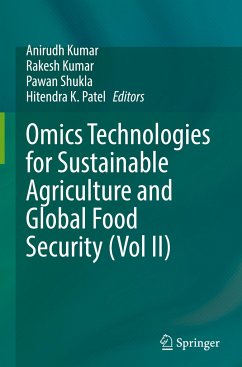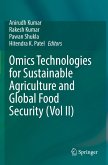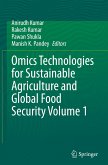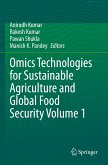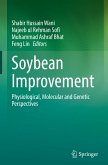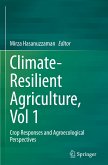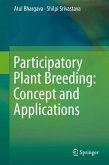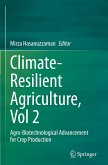Omics Technologies for Sustainable Agriculture and Global Food Security (Vol II)
Herausgegeben:Kumar, Anirudh; Kumar, Rakesh; Shukla, Pawan; Patel, Hitendra K.
Omics Technologies for Sustainable Agriculture and Global Food Security (Vol II)
Herausgegeben:Kumar, Anirudh; Kumar, Rakesh; Shukla, Pawan; Patel, Hitendra K.
- Gebundenes Buch
- Merkliste
- Auf die Merkliste
- Bewerten Bewerten
- Teilen
- Produkt teilen
- Produkterinnerung
- Produkterinnerung
This edited book brings out a comprehensive collection of information on the modern omics-based research. The main focus of this book is to educate researchers about utility of omics-based technologies in rapid crop improvement. In last two decades, omics technologies have been utilized significantly in the area of plant sciences and has shown promising results. Omics technology has potential to address the challenge of food security in the near future. The comprehensive use of omics technology occurred in last two decades and helped greatly in the understanding of complex biological problems,…mehr
Andere Kunden interessierten sich auch für
![Omics Technologies for Sustainable Agriculture and Global Food Security (Vol II) Omics Technologies for Sustainable Agriculture and Global Food Security (Vol II)]() Omics Technologies for Sustainable Agriculture and Global Food Security (Vol II)121,99 €
Omics Technologies for Sustainable Agriculture and Global Food Security (Vol II)121,99 €![Omics Technologies for Sustainable Agriculture and Global Food Security Volume 1 Omics Technologies for Sustainable Agriculture and Global Food Security Volume 1]() Omics Technologies for Sustainable Agriculture and Global Food Security Volume 1121,99 €
Omics Technologies for Sustainable Agriculture and Global Food Security Volume 1121,99 €![Omics Technologies for Sustainable Agriculture and Global Food Security Volume 1 Omics Technologies for Sustainable Agriculture and Global Food Security Volume 1]() Omics Technologies for Sustainable Agriculture and Global Food Security Volume 1121,99 €
Omics Technologies for Sustainable Agriculture and Global Food Security Volume 1121,99 €![Soybean Improvement Soybean Improvement]() Soybean Improvement161,99 €
Soybean Improvement161,99 €![Climate-Resilient Agriculture, Vol 1 Climate-Resilient Agriculture, Vol 1]() Climate-Resilient Agriculture, Vol 1241,99 €
Climate-Resilient Agriculture, Vol 1241,99 €![Participatory Plant Breeding: Concept and Applications Participatory Plant Breeding: Concept and Applications]() Atul BhargavaParticipatory Plant Breeding: Concept and Applications81,99 €
Atul BhargavaParticipatory Plant Breeding: Concept and Applications81,99 €![Climate-Resilient Agriculture, Vol 2 Climate-Resilient Agriculture, Vol 2]() Climate-Resilient Agriculture, Vol 2145,99 €
Climate-Resilient Agriculture, Vol 2145,99 €-
-
-
This edited book brings out a comprehensive collection of information on the modern omics-based research. The main focus of this book is to educate researchers about utility of omics-based technologies in rapid crop improvement. In last two decades, omics technologies have been utilized significantly in the area of plant sciences and has shown promising results. Omics technology has potential to address the challenge of food security in the near future. The comprehensive use of omics technology occurred in last two decades and helped greatly in the understanding of complex biological problems, improve crop productivity and ensure sustainable use of ecosystem services. This book is of interest to researchers and students of life sciences, biotechnology, plant biotechnology, agriculture, forestry, and environmental sciences. It is also a useful knowledge resource for national and international agricultural scientists.
Produktdetails
- Produktdetails
- Verlag: Springer / Springer Nature Singapore / Springer, Berlin
- Artikelnr. des Verlages: 978-981-16-2955-6
- 1st edition 2021
- Seitenzahl: 364
- Erscheinungstermin: 6. August 2021
- Englisch
- Abmessung: 241mm x 160mm x 26mm
- Gewicht: 711g
- ISBN-13: 9789811629556
- ISBN-10: 9811629552
- Artikelnr.: 61768677
- Herstellerkennzeichnung Die Herstellerinformationen sind derzeit nicht verfügbar.
- Verlag: Springer / Springer Nature Singapore / Springer, Berlin
- Artikelnr. des Verlages: 978-981-16-2955-6
- 1st edition 2021
- Seitenzahl: 364
- Erscheinungstermin: 6. August 2021
- Englisch
- Abmessung: 241mm x 160mm x 26mm
- Gewicht: 711g
- ISBN-13: 9789811629556
- ISBN-10: 9811629552
- Artikelnr.: 61768677
- Herstellerkennzeichnung Die Herstellerinformationen sind derzeit nicht verfügbar.
Dr. Anirudh Kumar, PhD, is a research faculty member in the Department of Botany, Indira Gandhi National Tribal University (IGNTU), Amarkantak, MP, India. Over a 10 plus year career as a researcher in the area of plant molecular biology and plant pathology. During 2015-2016, he was working at CCMB, Hyderabad as DBT-Research Associate. He received M.Sc. and Ph.D. from University of Hyderabad, India. His current research interests span from antioxidants studies of medicinal plants to plant pathology. He is author and co-author of several papers on different aspect of plant biology. He also teaches courses for B.Sc., M. Sc. and Ph.D. degree. For the past few years, his research group is trying to studies phytochemical profiles of native plants traditionally used by tribal healers of Amarkantak, MP, India. Dr. Rakesh Kumar is a plant biologist and researcher, currently working as assistant professor in School of Life Sciences, University of Karnataka, India. He has obtained his PhD in plant sciences from University of Hyderabad, and an alumnus of International Crops Research Institute for the Semi-Arid Tropics (ICRISAT), Patancheru, India. During his past 11 years of research, he has worked in the area of molecular plant biotechnology and crop improvement. His expertise includes genomics and OMICS approaches such as mutagenesis, TILLING, Eco-TILLING, transcriptomics, sequencing, QTL-seq, trait and gene discovery, and LC-MS and GC-MS based proteomics and metabolomics. He has published several high impact research papers, reviews, book chapters and obtained research grants from both national and international funding agencies. Dr. Pawan Shukla is Scientist in Central Silk Board, Ministry of Textile, Govt. of India, Bangalore since 2015. He obtained his M.Sc. and Ph.D. from University of Hyderabad. He was Dr. D. S. Kothari post-doctoral fellow at University of Hyderabad during 2014-2015. He is having 12 years of experiences of working in the area of plant molecular biology and genetic engineering. During his Ph.D., he developed a plant gene-based pollination control system which has practical implication in hybrid seed production. In addition to this, he worked on the development of transgenic plants tolerance to different abiotic and biotic stresses. At present, he is associated with the biotechnology division of Central Sericultural Research & Training Institute (CSR&TI), Central Silk Board, Pampore, Kashmir, J&K (UT) and His laboratory is working on the development of cold tolerant mulberry variety. He has published several research papers in reputed International & National Journals and editor in 03 books published by CSR&TI, Central Silk Board Pampore. Dr. Hitendra Kumar Patel completed his master degree in Biotechnology from Guru Ghasidas Central University, Chhattisgarh and PhD in Molecular Life Sciences from International Centre for Genetic Engineering and Biotechnology, Trieste, Italy. He is currently leading the rice functional genomics group at CSIR-Centre for Cellular and Molecular Biology (CSIR-CCMB), Hyderabad, India. His research activities are focused on developing novel rice varieties and also on understanding the mechanisms of the interactions between plants and their pathogens. He was involved in the identification and characterization of several virulence functions including EPS, LPS, Cell wall degrading enzymes (CWDEs) and T3SS effector proteins of bacterial pathogen Xanthomonas oryzae pv. oryzae. He was involved in popularization and licensing of Improved Samba Mahsuri rice; a bacterial blight disease resistant and low GI (diabetic-friendly) rice for which the team has won prestigious CSIR Technology award and DBT award. He is an associate editor for Science India portal and recognizing his contribution, he has been selected as Associate Fellow of Telangana, India.
Chapter 1. Integrating phenomics with breeding for climate-smart agriculture.- Chapter 2. Application of 'omics' technologies in crop breeding.- Chapter 3. Omics Technologies and Molecular Farming: Applications and Challenges.- Chapter 4. Omics to understand drought tolerance in plants: An update.- Chapter 5. Recent Advances in Transcriptomics: An Assessment of Recent Progress in Fruit Plants.- Chapter 6. Harnessing Perks of MiRNA Principles for Betterment of Agriculture and Food Security.- Chapter 7. Potential of Metabolomics in Plant Abiotic Stress Management.- Chapter 8. Integrating Pan-Omics Data in a Systems Approach for Crop Improvement: Opportunities and Challenges.- Chapter 9. Application of nanobiotechnology in agriculture: Novel strategy for food security.- Chapter 10. Understanding and manipulation of plant microbe interaction signals for yield enhancement.- Chapter 11. Next generation biofuel production in the omics era: Potential and prospects.- Chapter 12. Multi omicstechnologies and genetic modification in plants: Rationale, opportunities and reality.- Chapter 13. Social acceptance and regulatory prospects of genomics in addressing food security.
Chapter 1. Integrating phenomics with breeding for climate-smart agriculture.- Chapter 2. Application of 'omics' technologies in crop breeding.- Chapter 3. Omics Technologies and Molecular Farming: Applications and Challenges.- Chapter 4. Omics to understand drought tolerance in plants: An update.- Chapter 5. Recent Advances in Transcriptomics: An Assessment of Recent Progress in Fruit Plants.- Chapter 6. Harnessing Perks of MiRNA Principles for Betterment of Agriculture and Food Security.- Chapter 7. Potential of Metabolomics in Plant Abiotic Stress Management.- Chapter 8. Integrating Pan-Omics Data in a Systems Approach for Crop Improvement: Opportunities and Challenges.- Chapter 9. Application of nanobiotechnology in agriculture: Novel strategy for food security.- Chapter 10. Understanding and manipulation of plant microbe interaction signals for yield enhancement.- Chapter 11. Next generation biofuel production in the omics era: Potential and prospects.- Chapter 12. Multi omicstechnologies and genetic modification in plants: Rationale, opportunities and reality.- Chapter 13. Social acceptance and regulatory prospects of genomics in addressing food security.

